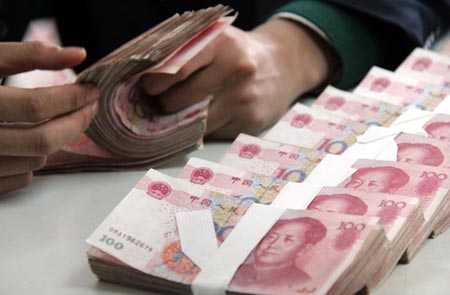China fiscal revenue up 12.7% Jan. to May
 0 Comment(s)
0 Comment(s) Print
Print E-mail Xinhua, June 11, 2012
E-mail Xinhua, June 11, 2012
 |
|
In May , China's fiscal revenue reached 1.2 trillion yuan, up 13.1 percent year on year, the Ministry of Finance said Monday. [File Photo] |
China's fiscal revenue in the first five months rose 12.7 percent from the same period a year ago to nearly 5.3 trillion yuan (841.3 billion U.S. dollars), the Ministry of Finance (MOF) said Monday.
The increase was down 19.3 percentage points compared to the Jan.- May period last year.
The ministry attributed the slower growth to economic weakness, slower price rises, dwindling corporate profits and tax cuts to adjust revenue distribution.
China's fixed-asset investment rose 20.1 percent year-on-year to 10.89 trillion yuan in the first five months, 0.1 percentage point lower than the figure for the first four months. It marked the third consecutive monthly slowdown, the National Bureau of Statistics (NBS) said Saturday.
Other key measures such as the industrial value-added output and retail sales both saw slower growth in the first five months as the country's economy cooled.
"There is no need to over-react to the easing pace because it is still within budget scope," said Gao Peiyong, head of the National Academy of Economic Strategy under the Chinese Academy of Social Sciences.
The country's inflation, however, unexpectedly eased to a 23-month low due to falling food prices and the base effect, said the NBS.
From January to April, profits of the industrial enterprises of scale -- referring to enterprises with annual sales revenue exceeding 5 million yuan each -- declined 1.6 percent from a year earlier, according to the NBS.
In May alone, the country's fiscal revenue reached 1.2 trillion yuan, up 13.1 percent year-on-year, the ministry said.
The monthly growth compares to a 6.9-percent increase in April. The faster increase in May was driven by aggressive profit growth of the banking sector which is due to file its 2011 annual corporate income tax this month, the ministry said.
"It is irrational to judge the overall trends simply from the May figure," said Liu Shangxi, deputy chief of the Research Institute for Fiscal Science under the MOF.
He attributed the faster growth in May to seasonal factors and improving foreign trade.
China's foreign trade trumped market forecasts to post a double-digit growth rate in May, boosted by slightly-improved external markets and more working days in the month.
The MOF data showed that tax revenue nationwide climbed 9.4 percent year-on-year in the first five months. The growth was down 21.4 percentage points compared with the same period last year, the ministry said.
"The government should stick to the structural taxation reduction plan as long as the expansion of both fiscal and tax revenue is within expectation," said Gao.
He has estimated a total of 600 billion yuan, or about half of the government's budget deficit, in structural taxation reduction this year, which will help ease burdens on enterprises.
China has more buffers on the fiscal policy side than many other economies, as well as more room for monetary easing after the recent tightening cycle, analysts said.
Last week, the country's central bank cut benchmark interest rates for the first time in more than three years.
In addition to high-caliber loosening, the government has pinned its hopes on proactive fiscal measures to buoy the economy, as its government debt ratio, which is significantly lower than that of other nations, allows more room for spending.
The State Council, or cabinet, said China will adopt more fiscal measures targeted at boosting domestic demand, including the initiation of major projects outlined in the 12th Five-Year Plan (2011-2015) to fuel infrastructure investment and structural tax reduction.
Other options at the government's disposal include consumption-boosting measures and expansion of the social security network.
With a sufficient fiscal surplus, the government will be able to further expand its social security network and push income reforms, said Zhao Qingming, a senior researcher with China Construction Bank.
Monday's data showed that the country's fiscal expenditure totaled 4.1 trillion yuan in the first five months of this year, up 22.4 percent from a year ago.






Go to Forum >>0 Comment(s)